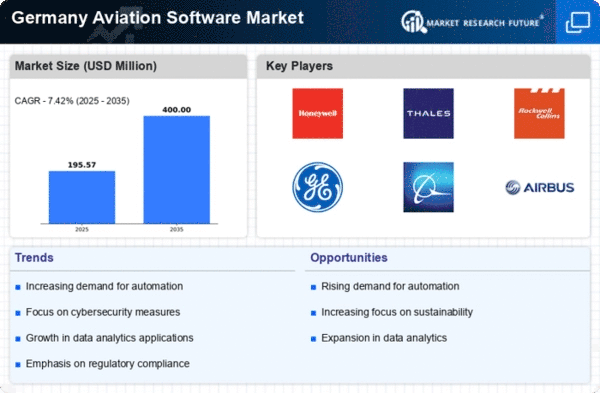Technological Advancements in Aviation
Technological advancements play a pivotal role in shaping the aviation software market in Germany. Innovations such as real-time data analytics, predictive maintenance, and enhanced flight management systems are becoming essential for operational efficiency. The integration of these technologies allows airlines and operators to optimize their operations, reduce costs, and improve customer satisfaction. In 2025, the market is expected to witness a surge in demand for software solutions that leverage these advancements, with an estimated market value reaching €1.5 billion. This trend indicates a robust growth trajectory, driven by the need for modernized aviation operations.
Growing Emphasis on Customer Experience
In the aviation software market, there is a growing emphasis on enhancing customer experience. Airlines in Germany are increasingly adopting software solutions that improve passenger engagement, streamline booking processes, and provide personalized services. This shift is driven by the competitive landscape, where customer satisfaction is paramount. As of 2025, the market is anticipated to expand by 5.5%, reflecting the increasing investment in customer-centric software solutions. The focus on improving the passenger journey is likely to drive innovation and growth within the aviation software market, as companies seek to differentiate themselves through superior service.
Regulatory Compliance and Safety Standards
The aviation software market in Germany is significantly influenced by stringent regulatory compliance and safety standards. The European Union Aviation Safety Agency (EASA) mandates rigorous adherence to safety protocols, which necessitates the integration of advanced software solutions. This compliance drives demand for aviation software that can ensure operational safety and regulatory adherence. As of 2025, the market is projected to grow at a CAGR of approximately 6.5%, reflecting the increasing need for software that meets these evolving regulations. Companies are investing in software that not only enhances safety but also streamlines compliance processes, thereby fostering growth in the aviation software market.
Increased Demand for Operational Efficiency
The aviation software market in Germany is experiencing heightened demand for operational efficiency. Airlines and operators are increasingly seeking software solutions that can streamline processes, reduce turnaround times, and enhance overall productivity. This demand is driven by competitive pressures and the need to maximize profitability. As of November 2025, the market is projected to grow by approximately 7% annually, as organizations invest in software that facilitates better resource management and operational workflows. The focus on efficiency is likely to propel innovations in the aviation software market, leading to the development of more sophisticated solutions.
Sustainability Initiatives and Environmental Regulations
Sustainability initiatives and environmental regulations are becoming critical drivers in the aviation software market in Germany. With increasing pressure to reduce carbon emissions and enhance fuel efficiency, airlines are turning to software solutions that support sustainable practices. The implementation of software that optimizes flight paths and reduces fuel consumption is gaining traction. By 2025, the market is expected to grow by 6% as companies invest in technologies that align with environmental goals. This focus on sustainability not only meets regulatory requirements but also appeals to environmentally conscious consumers, thereby influencing the aviation software market.
















